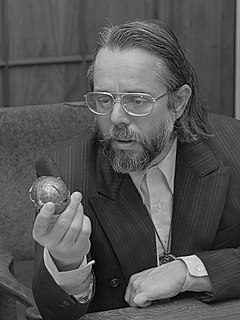A Quote by William Ernest Hocking
We are driven to confess that we actually care more for religion than we do for religious theories and ideas: and in merely making that distinction between religion and its doctrine-elements, have we not already relegated the latter to an external and subordinate position? Have we not asserted that "religion itself" has some other essence or constitution than mere idea or thought?
Related Quotes
What our view of the effectiveness of religion in history does at once make evident as to its nature is--first, its necessary distinction; second, its necessary supremacy. These characters though external have been so essential to its fruitfulness, as to justify the statement that without them religion is not religion. A merged religion and a negligible or subordinate religion are no religion.
I think there in a great deal to be said for religious education in the sense of teaching about religion and biblical literacy. Both those things, by the way, I suspect will prepare a child to give up religion. If you are taught comparative religion, you are more likely to realise that there are other religions than the one you have been brought up in. And if you are if you are taught to read the bible, I can think of almost nothing more calculated to turn you off religion.
LAUGHTER is the very essence of religion. Seriousness is never religious, cannot be religious. Seriousness is of the ego, part of the very disease. Laughter is egolessness. Yes, there is a difference between when you laugh and when a religious man laughs. The difference is that you laugh always about others - the religious man laughs at himself, or at the whole ridiculousness of man's being. Religion cannot be anything other than a celebration of life.
I was raised in a religious home. It was unreasonable enforced religion that turned me off it. It was a joyless, unpleasant, stupid, barbaric thing when I was a child and I've never gotten over that feeling. If you're talking about religion it's one thing; I don't hold Jewish religion with any more seriousness than I would any other.
Spirituality is much wider than any particular religion, and in the larger ideas of it that are now coming on us even the greatest religion becomes no more than a broad sect or branch of the one universal religion, by which we shall understand in the future man's seeking for the eternal, the divine, the greater self, the source of unity and his attempt to arrive at some equation, some increasing approximation of the values of human life with the eternal and the divine values.
Art is not a substitute religion: it is a religion (in the true sense of the word: 'binding back', 'binding' to the unknowable, transcending reason, transcendent being). But the church is no longer adequate as a means of affording experience of the transcendental, and of making religion real - and so art has been transformed from a means into the sole provider of religion: which means religion itself.
Independent of the critique I'm making, I'm just trying to paint a more comprehensive portrait of American religion than you get from a right versus left, religious conservatives versus secular liberal, believer versus atheist, binary. Too often, we just look at religion in America through that kind of either/or lens. I think it's much more complicated than that.
If therefore my work is negative, irreligious, atheistic, let it be remembered that atheism — at least in the sense of this work — is the secret of religion itself; that religion itself, not indeed on the surface, but fundamentally, not in intention or according to its own supposition, but in its heart, in its essence, believes in nothing else than the truth and divinity of human nature.
"Religion" can no more be equated with what goes on in churches than "education" can be reduced to what happens in schools or "health care" restricted to what doctors do to patients in clinics. The vast majority of healing and learning goes on among parents and children and families and friends, far from the portals of any school or hospital. The same is true for religion. It is going on around us all the time. Religion is larger and more pervasive than churches.








































